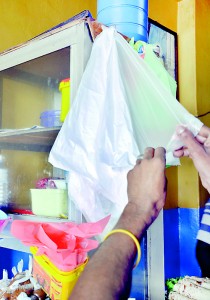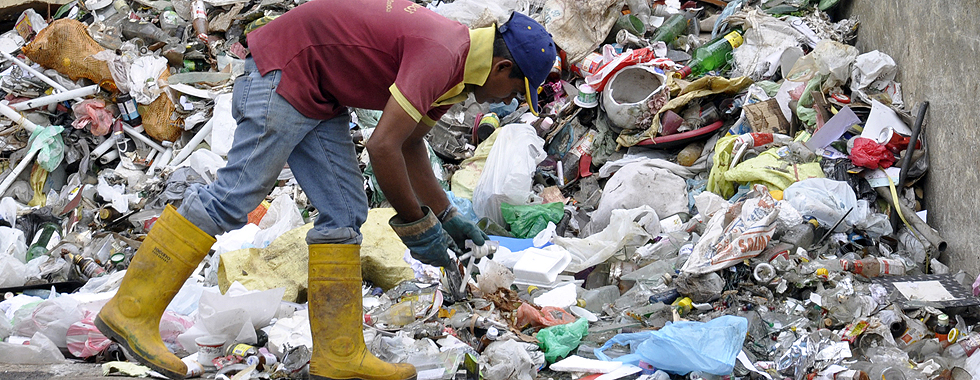Sunday Times 2
War against plastic waste hampered by don’t-care public
The government is fighting a battle against companies making and using non- recyclable “sili-sili” bags with one hand tied behind its back by the public and local bodies that couldn’t care less about the plastic’s damage to the environment.

Lunch sheets at a hotel in Colombo. Pix by Susantha Liyanawatte
This week the Central Environment Authority (CEA) began a concerted campaign to stamp out the use of non-biodegradable and non-recyclable thin polythene (20 and less micron thickness) lunch sheets and plastic carry bags that are in wide circulation despite a ban imposed seven years ago.
“The campaign will go full-throttle from July,” said CEA Director (Waste Management), Ajith Weerasundara.
“We will be raiding places manufacturing thin polythene and taking legal action against them as well as seizing products that are in the market.
“Amendments to the Gazette are being sought to increase the plastic thickness level of 20 microns. This will make recycling easier.”
 He said discussions would be held with local government authorities, supermarket managements as well as traders associations in reducing the use of polythene bags and promoting eco-bags as well as the re-using of grocery bags.
He said discussions would be held with local government authorities, supermarket managements as well as traders associations in reducing the use of polythene bags and promoting eco-bags as well as the re-using of grocery bags.
“Though supermarkets generally give out polythene bags it is important to discourage the use of these bags altogether.
“But we have been told that the public still prefers polythene bags over eco-friendly, re-usable bags or cane baskets.”
A dismaying 95 per cent of people interviewed in five districts in recent research preferred using polythene lunch sheets and shopping bags while only 5 per cent were interested in reducing the use of polythene and plastics.
“It is important to create a strong campaign against the use of thin polythene that cannot be recycled,” said CEA’s Director of the Post-Consumer Plastic Waste Management Project, Bandula Sarathkumara, whose unit carried out the research jointly with the University of Kelaniya.
“From municipal councils to pradeshiya sabhas there should be involvement of local authorities to hold awareness campaigns and promote waste segregation,” Mr. Weerasundara said.
The use of ultra-thin polythene was banned by a Gazette 1466/5 under the National Environment Act in October 2006 that was in implementation from 2007. Those violating the Act face a maximum fine of Rs 10,000 or a two-year jail term, or both.

The newly opened plastic and thick polythene recycling plant in Kaduwela
A thin polythene lunch sheet is 2-4 microns while thin shopping bags vary from 7-9 microns.
Mr. Sarathkumara said Sri Lanka imported 500,000 metric tons of virgin plastic (not recycled) annually. Of this, 30 per cent was re-exported as finished products and 70 per cent was consumed locally. Of the plastic used locally, 40-50 per cent is discarded as post-consumer waste.
“At present less than 50 per cent is recycled and we are hoping to achieve an 80 percent target before 2020,” Mr. Sarathkumara said.
Polythene, which is a major element in present garbage dumps, would take 500 to 1000 years to decompose.
Mr. Sarathkumara said plastic and thick polythene recycling plants have been set up by the Kurunegala Municipal Council, Balangoda Urban Council, Anuradhapura Municipal Council, Matara Municipal Council and the recently opened Kaduwela Municipal Council. These plants are equipped with polythene compactor and a plastic crusher.
He said a kilo of crushed plastic was sold at Rs. 50-60 and purchased by plastic manufacturers. “Local councils can earn an extra income from recycling plastic,” he said, adding that the CEA planned to support local government bodies and private sector to set up 25 recycling centres covering the entire country in the next year or two.
The CEA has also purchased three washing plants worth a total of Rs. 15 million and handed these over to three major recyclers in Horana, Wattala and Moratuwa. The washing plants will wash contaminated plastic such as plastic margarine containers to dirty polythene bags.
The problem was, however, that most local authorities fail to encourage segregation of garbage.
“We introduced the colour garbage disposal bag system to the Kandy Municipal Council with waste paper in blue, glass in red and plastic in orange bags. The KMC also distributed 50,000 bags. These should continue in other areas as well,” Mr. Sarathkumara said.
| Capital spews out 150 metric tons
Colombo is the worst plastic waste contributor with 750 metric tons of waste produced on a daily basis of which 20 per cent comprises polythene and plastic. Regardless of this, the local government authority has not set up a plastic and polythene recycling plant. “This year our focus is to set up a recycling plant in Colombo and Kandy. Discussions are taking place both with the Colombo and Kandy Municipal Council authorities,” said Mr. Sarathkumara. |

